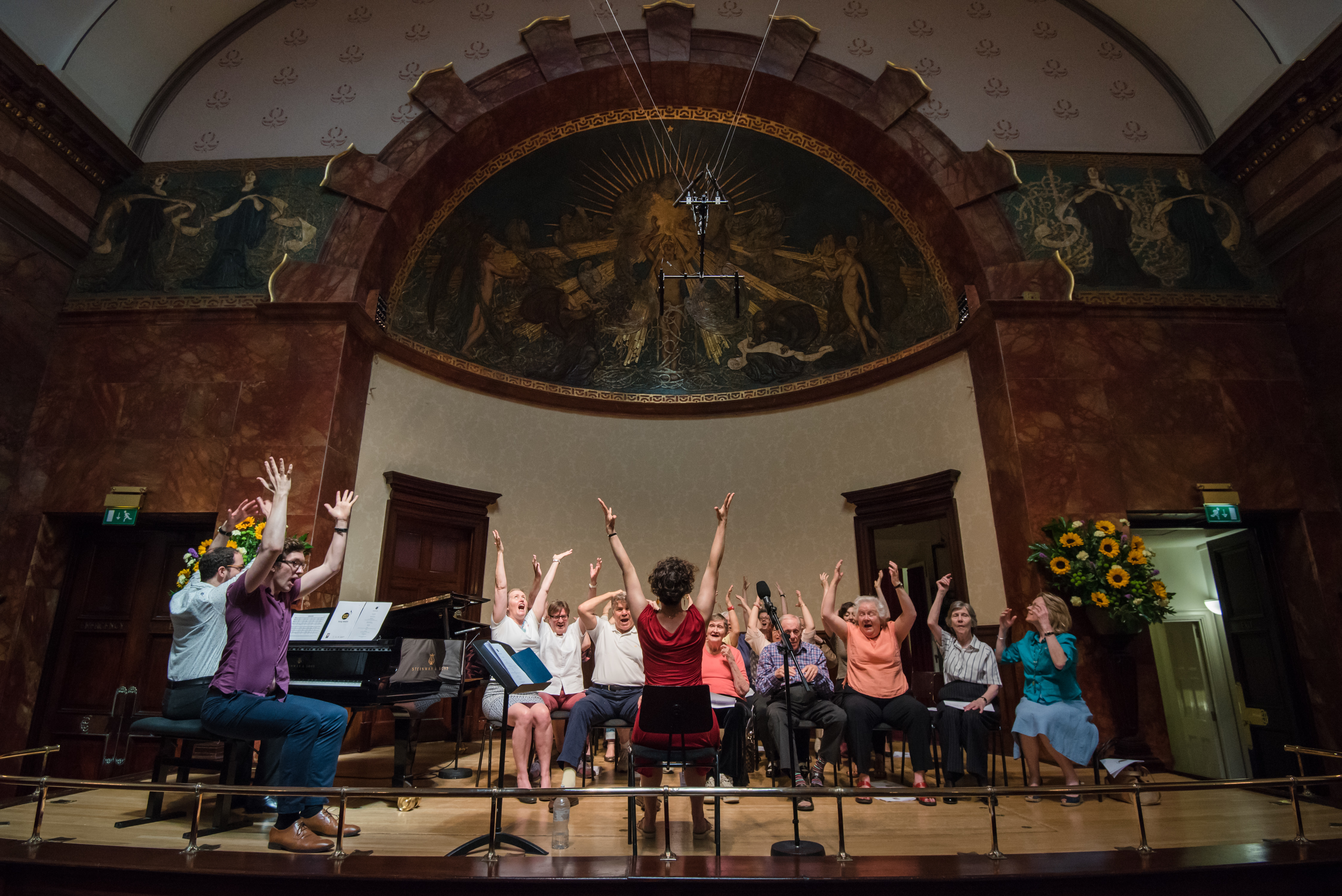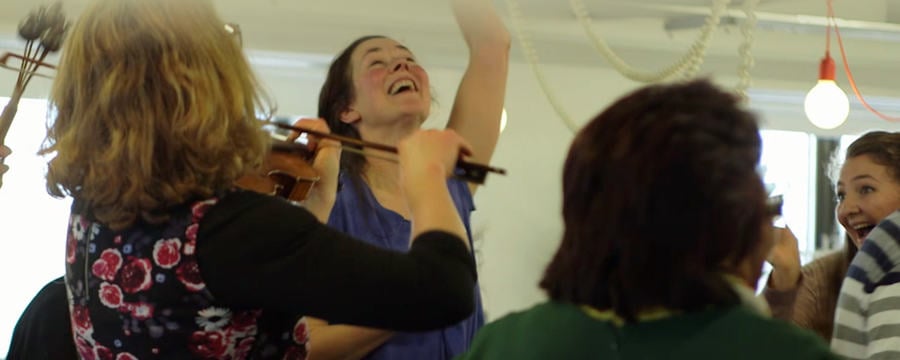Creating successful arts-based groups for people living with dementia

Share this step
By Hermione Jones, Programme Manager: Music for Life
Context
For over 20 years Wigmore Hall Learning has been giving people of all ages, backgrounds and abilities opportunities to take part in creative music making, engaging a broad and diverse range of people through innovative creative projects, concerts, workshops and online resources. As an organisation we are passionate about the impact music can have on our lives and on our society, and three core values lie at the heart of our work: creativity, collaboration and equality. These are values which reflect the spirit of chamber music, and this inspires all that we do: making music together as an ensemble, with every voice heard and equally valued.
Music for Life is our pioneering programme for people living with dementia and their families, friends and carers. Founded by Linda Rose in 1993 and led by Wigmore Hall since 2009, over the course of the past 25 years the programme has continued to develop from working primarily in care settings to incorporating a growing number of projects and events in community settings and at the Hall itself.
Reflections
Each project provides a unique opportunity to learn from one another and to find new ways of connecting and communicating. When there is a tangible connection between people, something that is authentic and meaningful to those involved, you create a space where there is a freedom for creative expression and the sense of anything being possible. I have witnessed some of the most breath-taking musical conversations, and the real beauty is that it would be impossible to recreate them.
These experiences continue to enrich me through appreciating and cherishing the connections we can share in the present moment. Learning to move away from defining things by what has gone before, or what may still be to come, and instead to embark on exploring the unknown together. That, in itself, is quite a challenge and is one of the things that makes managing the programme so exciting and rewarding.
In order to explore the unknown, I feel there are elements that contribute to a more creative environment. There are many factors involved in the group dynamics and creative process, but the initial conversations and set up that takes place before the group is even formed, can be equally important. This can go a long way towards providing a space in which people are able to take creative risks and feel comfortable and supported enough to share something of themselves.
Project Example
Singing with Friends is a community choir for families living with dementia in partnership with Resonate Arts. Since its formation in January 2017, the choir has gone from strength to strength, sharing many musical moments and successes together including taking part in a recording for BBC Radio 3, featuring in an article for The Telegraph, giving termly performances onstage at Wigmore Hall, being selected as a finalist for a Dementia Care Award 2017 in the Outstanding Arts and Creativity in Dementia Care category, and performing at Buckingham Palace.
When I started in my role managing Music for Life, an area of the budget had been allocated to develop a choir for families living with dementia. This was in direct response to feedback from community projects for people living with dementia in partnership with Resonate Arts and the Royal Academy of Music. The feedback demonstrated a need for more ongoing activity. A strong partnership with Resonate Arts was already established and this provided a foundation from which to explore ideas together. In terms of making decisions on the structure, recruitment, and ongoing support, this was all in collaboration with partners and the musician team. We had a clear sense of our roles as organisations and together we put in place a framework within which the group could form. The aim was to create a choir that would evolve and find its way alongside those involved, and for the sessions to be shaped in response to the group.
Family members, friends, carers, Wigmore Hall staff and people living with dementia are all members of the choir equally, with each voice and personality contributing to the dynamic and spirit of the group as a whole. Choir members are included in decision making, whether it be the group name, selection of repertoire, or other ideas for the future. As the choir established itself, there was an increase in external interest and lots of exciting opportunities came our way. We did not set up the choir with performances in mind, but it turned out that we would go on to achieve things that could never have been envisaged at the outset. Again, these decisions are made collaboratively and the priority is to ensure that the quality and integrity of the group is never compromised. There is a sense of pride, excitement and ownership as we continue our journey together.
Resonate Arts are closely involved in the recruitment for the choir and provide extensive support for group members before, during and between sessions, signposting and connecting people to other activities and identifying ways in which they may require additional support in order to attend.
Considerations
Below are some recommendations for key considerations based on my experience.
- Project motivation
It is important to understand and question why a project is taking place. What is the motivation behind it? What is driving the process? Is it in direct response to a need? Who articulated this need? Is it building on an existing project? Is it exploring something completely new? Being able to articulate this can help shape the work and ensure everyone involved has an awareness of why the project is taking place. It can also help in identifying areas that may require additional expertise, which can inform partnerships/collaborations. - Collaboration and partnership work
Building strong working relationships with others and establishing a shared understanding of roles, ethos and aims, is incredibly important. Each organisation will bring something different to the process and through collaborating it is possible to enhance the experience for those involved in a project by people drawing on their strengths and learning from one another. - Establishing a structure/framework
Once the decision has been made for the project to go ahead, and partnerships are in place, there are then some key things to consider in terms of how to structure the project. Does a framework already exist? What was this based on? Is it working well? Is it an adaption of an existing model? How long will the group run for and why/how were those decisions reached? What is the optimum group size and why? Who will facilitate the sessions and why? Is there a need for a product/performance and if so what is the reason for this? How are you making these decisions and could the group be involved in this process? It is incredibly important to establish an open and honest dialogue with the artistic team, as the decisions made at this stage will directly impact the way in which they work and feel in the space. Having a shared understanding of the structure and whether this is something that will remain fixed or is open to change is something worth clarifying. In order for the sessions to be responsive to the group, there needs to be a safe framework within which to work. - Training, development and support
Who is facilitating the sessions and are they receiving the support they need in order to take creative risks and share something of themselves in the work? It may be possible to incorporate the training of other artists into the project. This should be done if it will not compromise the group experience and you can ensure the opportunity will be a meaningful and supported one for the artist. - Reflective practice and measuring impact
Factoring in time for reflective practice can help ensure that areas for additional training and development are identified as well as enabling the team to feel supported during the project. In addition it will help you to evaluate the project as it progresses and make adjustments as needed to enhance the experience for all involved. Discussing how you will measure the impact of the project is equally important and ties in with the project motivations. - Progression routes
Is the group ongoing, a one-off event or a fixed length project? Endings can be difficult and people respond very differently to them. It’s a whole topic to explore in itself, but it is important to have an awareness of the impact endings can have and to think about how they will be acknowledged and what opportunities are available for people after or outside of the group.
To conclude I would like to share an encounter I had with a resident on a project in a care home. The conversation is one of the most profound I have ever had and continues to influence all that I do.
Gloria* asked me to pop by before the next session to remind her how much she enjoyed the music-making, as she was sure she would refuse to come again. When I went to see her, the TV was on and a CD player was pumping out the soundtrack of Grease the musical. I spoke to a staff member and asked if it would be ok for me to go and talk with Gloria as she was due to be in the music session that afternoon. As I approached, there were no obvious signs of acknowledgement. I sat beside her. I introduced myself and began explaining a bit about the project. No response. I said that I hoped she would join us and that she would be most welcome. She opened her eyes, looked directly at me and said “Darling, people here, they come and go, they come in, they go out, the TV is on, the music is playing, I sit here and pretend to be asleep. But the thing is:
“The world is round and I am a human being. I am a human being and I have music inside me.”
For me, that sums up everything. The world is round and we are all human beings. We are all human beings and we all have music inside us. When I am planning and setting up a project that is always at the forefront of my mind. From that place I try to create the best possible environment for each person involved to connect, communicate and express themselves. A place where each person is acknowledged as a human being and celebrated for what it is that makes them unique.
*name changed
Share this
Dementia and the Arts: Sharing Practice, Developing Understanding and Enhancing Lives

Dementia and the Arts: Sharing Practice, Developing Understanding and Enhancing Lives


Reach your personal and professional goals
Unlock access to hundreds of expert online courses and degrees from top universities and educators to gain accredited qualifications and professional CV-building certificates.
Join over 18 million learners to launch, switch or build upon your career, all at your own pace, across a wide range of topic areas.
Register to receive updates
-
Create an account to receive our newsletter, course recommendations and promotions.
Register for free







